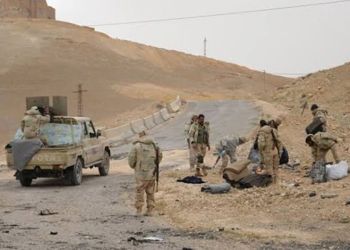This post is also available in:
![]() العربية
العربية
Before and after ISIS managed to gain control over the cities of Raqqa and Deir Ezzor in the east of Syria, ISIS leaders were preoccupied with the idea of how to attract the younger generation who have been part of the Syrian revolution, and turn them into elements under their absolute control. The events that the Syrian revolution went through made the wind blow in the direction desired by ISIS leaders, enabling them to direct their ships as they wish and wherever they want.
33-years-old Abu Mansour joined the ranks of ISIS in its early days in the province. At first, he went to Shadadi city near Hasakah, accompanied by a number of FSA fighters, where he secretly pledged his allegiance to the group. Then he returned to Deir Ezzor and continued operating under the command of the FSA in the province until the right time came and he publicly declared his allegiance to ISIS and joined its ranks. After that, he begun patrolling the streets of the province, along with ISIS fighters, to clear it of the FSA, which was and is still considered by the group as an apostate military formation made up of traitors.
Abu Mansour says: “After what I had heard about ISIS, I and some of my friends decided to pledge our allegiance to the group in order to save ourselves from fear, deprivation and war. The disintegration and disagreement within the ranks of the FSA, and the strength of ISIS, its solid structure, its management and market approach, which it advocates as true and pure Islamic approach. All of these reasons pushed me to join the ranks of the group “
The idea of calling for a strong Islamic organization attracted some FSA fighters who were suffering from the tragic circumstances of the war and disagreement within the FSA formations.
Abu Mansour speaks about his journey to Shadadi and says: ‘’ We decided to go to Shadadi along with an ISIS scholar in a car, which had the FSA flag on its roof. When we reached ISIS-held areas in Hasakah, Shadadi, we removed the flag and Abu Abduallah (the ISIS scholar) spoke to some ISIS members at a checkpoint then we continued our way until we reached one of the ISIS headquarters in Shadadi, where we later pledged our allegiance to the group. We stayed during the night in a house, which was said to belong to an ISIS police member in the town. The next day we returned our way and carried on operating under the command of the FSA. The more we met with the ISIS scholar (Abu Abduallah) the more we believed the FSA factions were nothing but a bunch of mercenaries and Sahawat (a term used by the group to refer to those are apostates according to it) ‘’
What ISIS scholars did was very huge and not easy to achieve at the same time. Fighting against the FSA, which had protected the families in Deir Ezzor and liberated areas from the regime, and viewing them as ‘ a bunch of apostates and enemies of Islam’ was the most important and the bases upon which ISIS based its work ’.
Abu Mansour says: The role that was entrusted to us in the beginning was to nominate people who have the tendencies to join Islamist formations and this is what actually was. However, the question of allegiance was handled by Abu Abdullah who was an expert and well-trained on these issues. The numbers of people secretly pledging their allegiance to ISIS began to increase day by day, and this made Abbu Abduallah very happy, and in return he rewarded us’’.
The weak and shaky organization of the FSA at that time gave ISIS the privilege to attract more elements to its ranks because of its administrative and financial organization that provided to the elements joining it greater comfort and assured them that their rights would not be wasted. Obtaining an amount of money if people leave their jobs and businesses to join ISIS was an available option too.
Those who pledged allegiance to the group justified their actions by saying that it was necessary for them to join the group to provide food and take care of their families. Abu Mansour says ‘’ our families were so much in need during the presence of the FSA in Deir Ezzor province and we were pushed to look for a job.”
He continues to state ‘’ ISIS was seen as the provider of all of these, however, the idea that we discovered later that this was to implement what the group had planned years before, and it was appropriately implemented in the Syria. Increasing its influence upon people in the name of Islam, and the dissemination of injustice in order to control and expand its control. In addition, the implementation of other unknown plans. Maybe this was the main reason which led me to leave the group, and later flee its controlled territory’’
Those who wanted to pledge their allegiance to the group would have to go through a number of ‘’repentance sessions’’ ending with a military and religious session. However, Abu Mansour and his colleagues did not go through a repentance session as they joined the group very early. Therefore, the sessions they went through were limited to military and religion. However, he later fled leaving behind ISIS that has extended its control over the province of Deir Ezzor, which was facilitated by people like him.










